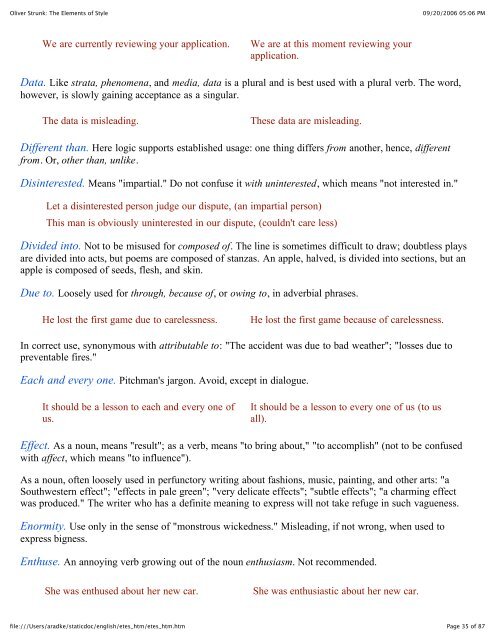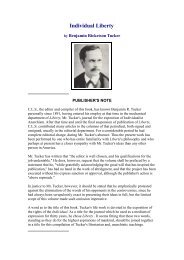Oliver Strunk: The Elements of Style - Evernote
Oliver Strunk: The Elements of Style - Evernote
Oliver Strunk: The Elements of Style - Evernote
Create successful ePaper yourself
Turn your PDF publications into a flip-book with our unique Google optimized e-Paper software.
<strong>Oliver</strong> <strong>Strunk</strong>: <strong>The</strong> <strong>Elements</strong> <strong>of</strong> <strong>Style</strong><br />
We are currently reviewing your application. We are at this moment reviewing your<br />
application.<br />
file:///Users/aradke/staticdoc/english/etes_htm/etes_htm.htm<br />
09/20/2006 05:06 PM<br />
Data. Like strata, phenomena, and media, data is a plural and is best used with a plural verb. <strong>The</strong> word,<br />
however, is slowly gaining acceptance as a singular.<br />
<strong>The</strong> data is misleading. <strong>The</strong>se data are misleading.<br />
Different than. Here logic supports established usage: one thing differs from another, hence, different<br />
from. Or, other than, unlike.<br />
Disinterested. Means "impartial." Do not confuse it with uninterested, which means "not interested in."<br />
Let a disinterested person judge our dispute, (an impartial person)<br />
This man is obviously uninterested in our dispute, (couldn't care less)<br />
Divided into. Not to be misused for composed <strong>of</strong>. <strong>The</strong> line is sometimes difficult to draw; doubtless plays<br />
are divided into acts, but poems are composed <strong>of</strong> stanzas. An apple, halved, is divided into sections, but an<br />
apple is composed <strong>of</strong> seeds, flesh, and skin.<br />
Due to. Loosely used for through, because <strong>of</strong>, or owing to, in adverbial phrases.<br />
He lost the first game due to carelessness. He lost the first game because <strong>of</strong> carelessness.<br />
In correct use, synonymous with attributable to: "<strong>The</strong> accident was due to bad weather"; "losses due to<br />
preventable fires."<br />
Each and every one. Pitchman's jargon. Avoid, except in dialogue.<br />
It should be a lesson to each and every one <strong>of</strong><br />
us.<br />
It should be a lesson to every one <strong>of</strong> us (to us<br />
all).<br />
Effect. As a noun, means "result"; as a verb, means "to bring about," "to accomplish" (not to be confused<br />
with affect, which means "to influence").<br />
As a noun, <strong>of</strong>ten loosely used in perfunctory writing about fashions, music, painting, and other arts: "a<br />
Southwestern effect"; "effects in pale green"; "very delicate effects"; "subtle effects"; "a charming effect<br />
was produced." <strong>The</strong> writer who has a definite meaning to express will not take refuge in such vagueness.<br />
Enormity. Use only in the sense <strong>of</strong> "monstrous wickedness." Misleading, if not wrong, when used to<br />
express bigness.<br />
Enthuse. An annoying verb growing out <strong>of</strong> the noun enthusiasm. Not recommended.<br />
She was enthused about her new car. She was enthusiastic about her new car.<br />
Page 35 <strong>of</strong> 87

















